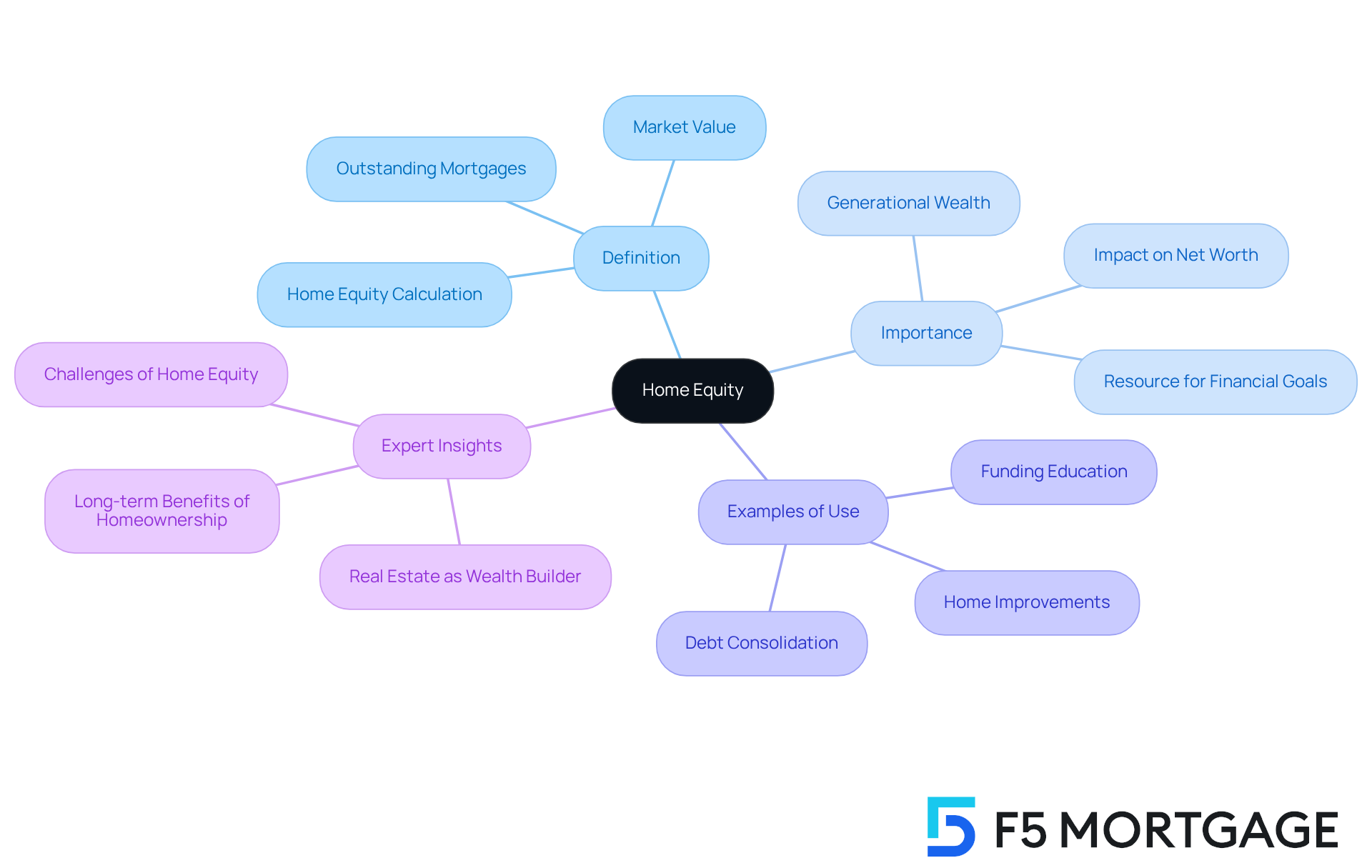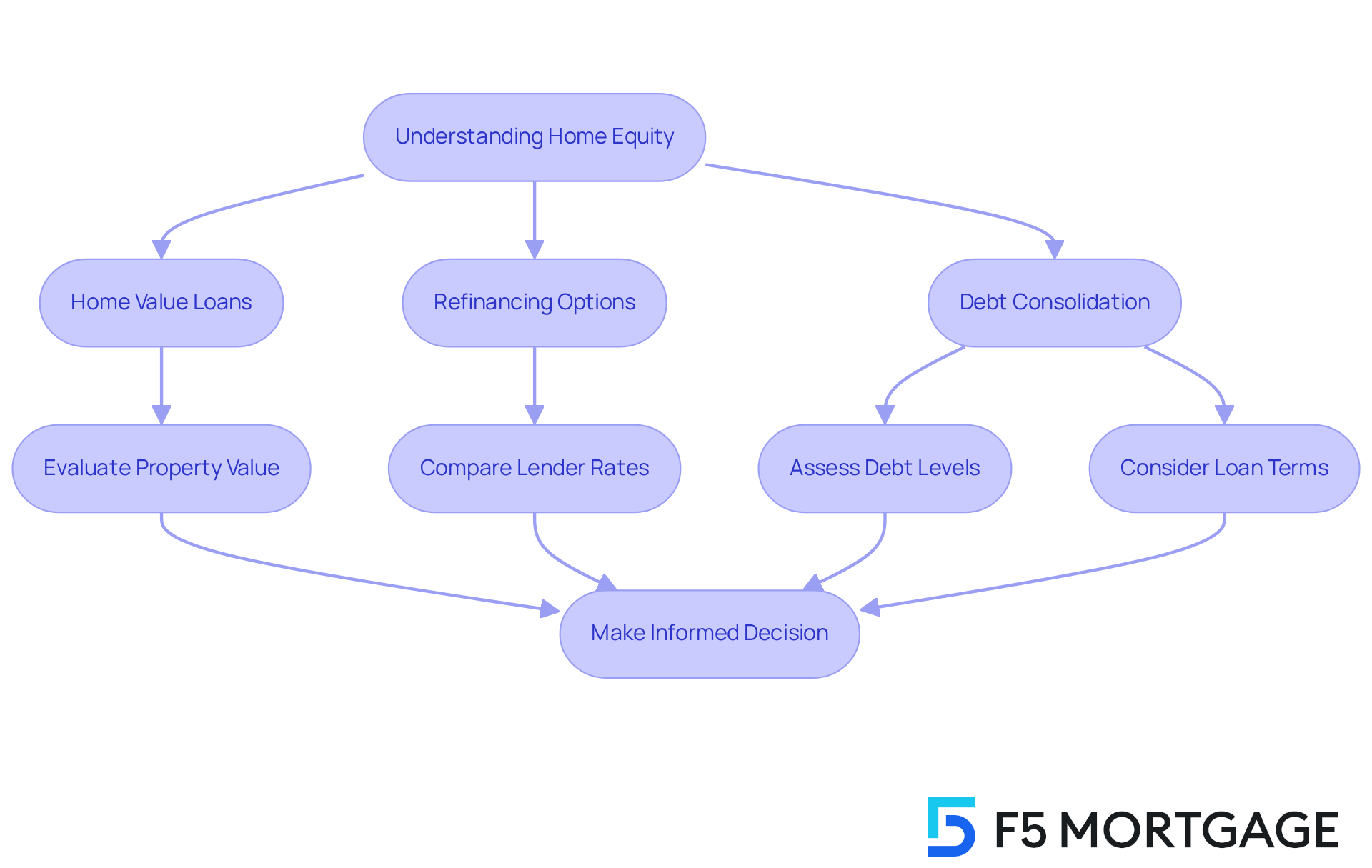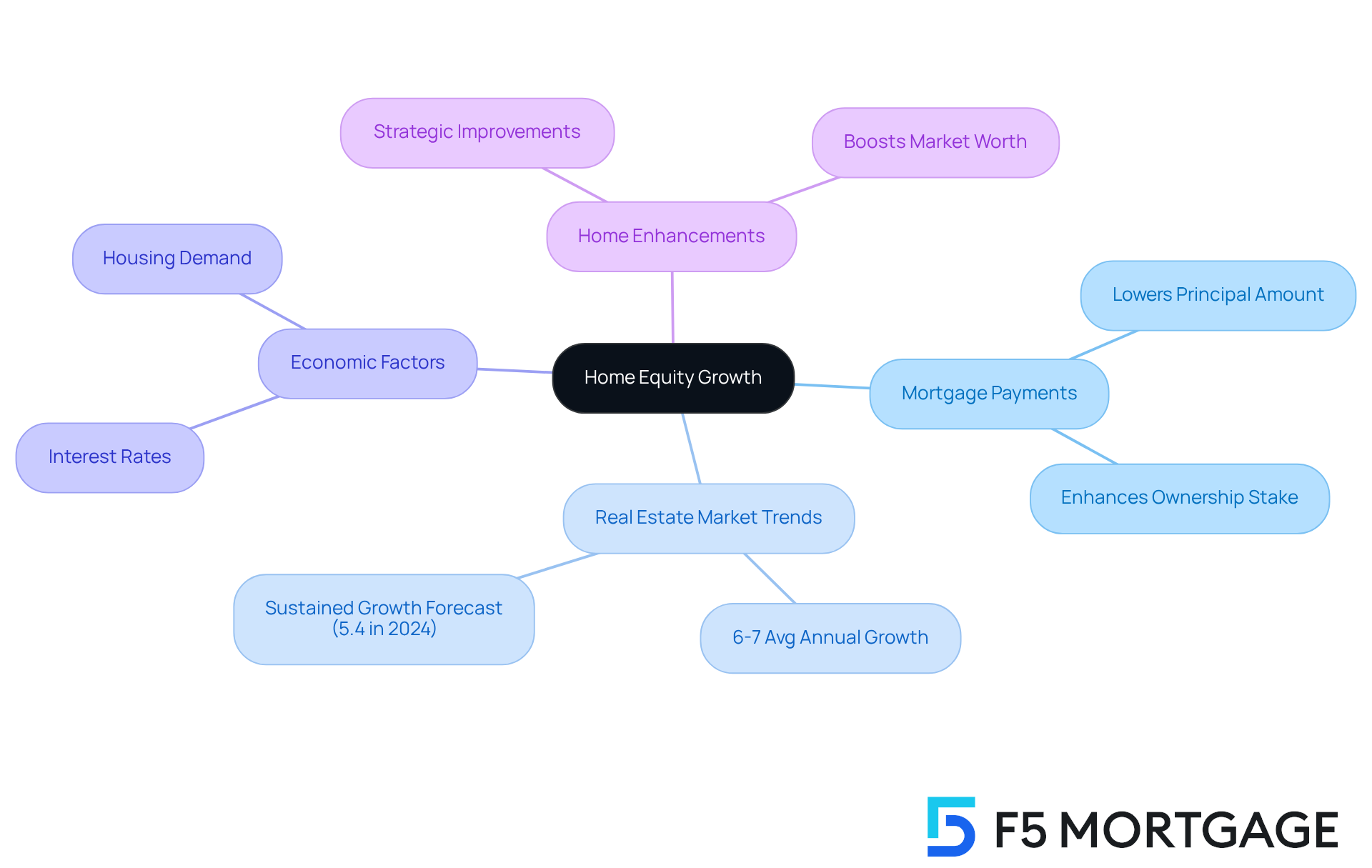Overview
Home equity is more than just a financial term; it represents the difference between your property’s market value and any outstanding debts. This difference can be a significant asset that influences your family’s financial future. We understand how challenging it can be to navigate these waters, but recognizing and leveraging your home equity can open doors to vital resources.
Imagine using this equity to fund your child’s education or to make much-needed home improvements. These are not just financial goals; they are steps toward enhancing your family’s overall economic stability and wealth growth. By taking control of your home equity, you can create a brighter future for your loved ones.
We’re here to support you every step of the way. Understanding your home equity is the first step in unlocking its potential. Let’s explore how you can make this valuable asset work for you.
Introduction
Understanding the nuances of home equity is crucial for families seeking to navigate their financial futures effectively. We know how challenging this can be, and this often-overlooked asset represents not just the difference between a property’s market value and outstanding debts, but also a significant opportunity for wealth generation and financial stability. As homeowners collectively hold trillions in residential value, the question arises: how can families leverage their home equity to secure a brighter economic future?
Amidst fluctuating market conditions and rising interest rates, it’s important to recognize that home equity can serve as a powerful tool. By tapping into this resource, families can explore various options that may lead to financial empowerment. We’re here to support you every step of the way as you consider how to make the most of this valuable asset.
Defining Home Equity: Understanding Its Importance
Understanding the value of property is essential for families navigating their financial journeys. Simply put, what does home equity mean is the value of a property, defined as the difference between its current market price and any outstanding mortgages or liens. For instance, if a house is valued at $300,000 and the owner owes $200,000, the property value difference is $100,000. This monetary asset often forms a significant part of a household’s net worth, which relates to what does home equity mean as it provides a vital resource for various financial needs.
We know how challenging it can be to manage finances, and many families have successfully utilized their property value for important goals, such as funding their children’s education. This approach can alleviate the burden of student loans, allowing families to invest in their futures. Additionally, homeowners frequently leverage their assets to make improvements to their residences, which can enhance property value and strengthen their overall financial position.
As we approach 2025, understanding what does home equity mean becomes increasingly important for households looking to make informed financial choices. With American homeowners collectively holding nearly $35 trillion in residential value, the potential for is significant. Understanding what does home equity mean is important, as home value not only influences a family’s net worth but also serves as a key resource for achieving economic objectives. Experts emphasize that real estate is a cornerstone of wealth, with property value providing a pathway to economic stability and growth.
Consider this insight from industry experts: ‘Real estate is one of the best ways to build generational wealth.’ This statement underscores the long-term benefits of homeownership. By utilizing home value wisely, families can enhance their economic well-being, making it an essential component of household budgeting. We’re here to support you every step of the way in understanding and maximizing your property value.

The Role of Home Equity in Homeownership and Financial Planning
Home ownership is not just about property ownership; it’s a crucial part of budgeting and financial stability. It serves as an indicator of wealth and a means for households to fund their needs. Home value loans and lines of credit provide homeowners with the opportunity to borrow against their assets for various purposes, such as debt consolidation, significant purchases, or property investments. As families work diligently to reduce their mortgages and benefit from rising property values, their ownership stake increases, fostering long-term economic stability.
In 2025, we anticipate an upward trend in the average amount borrowed against property value in the U.S. Many households are turning to these financial tools to manage their expenses more effectively. In fact, nearly two-thirds of borrowers cite property renovations as their primary motivation for seeking value loans. This illustrates how families are leveraging their assets to enhance their living spaces and overall quality of life.
Understanding what does home equity mean is essential for families looking to maximize their home value through the refinancing process in California. Refinancing a mortgage can help lower monthly payments or provide funds for various needs. By comparing rates, costs, and terms from different lenders, families can find the best fit for their unique financial situation. Partnering with F5 Mortgage can offer competitive rates and personalized service, making the refinancing journey smoother and more beneficial.
Experts highlight the advantages of residential asset loans, especially for consolidating higher-interest debts. With the average credit card interest rate hovering around 24.92%, tapping into home equity can present a more . Additionally, as families build their assets, they may qualify for better loan terms in the future, further solidifying their financial foundation. This makes understanding and utilizing what does home equity mean a key component of effective financial planning.
However, it’s important to recognize that 63% of homeowners identify high interest rates as a barrier to borrowing, which can pose challenges for families considering these options. Therefore, having a clear understanding of what does home equity mean, as well as property loans and lines of credit, is vital for making informed financial decisions. Home appraisals also play a significant role in determining property value and ownership stake, influencing refinancing possibilities and overall financial strategies. We know how challenging this can be, but we’re here to support you every step of the way.

Key Factors Influencing Home Equity Growth
Home value growth is influenced by several key factors, and we know how important this is for families like yours. Consistent mortgage payments can directly lower the principal amount, which enhances your ownership stake. As the real estate market grows, the worth of your property rises, further increasing that stake. For instance, national housing prices have seen an average rise of about 6-7% annually over the past ten years, with forecasts suggesting sustained growth of around 5.4% in 2024.
Economic elements, such as interest rates and housing demand, also play a crucial role. Lower interest rates can encourage refinancing, allowing homeowners to secure better terms and potentially speed up value growth. Furthermore, strategic residential enhancements can significantly boost your property’s market worth, aiding in value improvement.
We encourage families to actively monitor these factors. By understanding and addressing these elements, you can effectively manage and increase your home equity, which helps clarify what does home equity mean and ensures a solid foundation for your financial future. Remember, we’re here to every step of the way.

Conclusion
Understanding home equity is essential for families aiming to secure their financial future. This concept not only represents the value of a property but also serves as a critical asset that can be leveraged for various financial needs. By grasping what home equity means, families can make informed decisions that enhance their economic stability and growth.
The article highlights several key aspects of home equity, including its:
- Definition
- Importance in financial planning
- Various ways families can utilize it
From funding education to making home improvements, the potential uses of home equity are vast. Additionally, factors such as consistent mortgage payments, market trends, and economic conditions significantly influence home equity growth. This underscores the need for families to actively monitor and manage their properties.
Ultimately, recognizing the value of home equity is more than just understanding a financial term; it is about empowering families to take control of their financial destiny. By leveraging home equity wisely and staying informed about market trends, families can pave the way for long-term wealth and stability. Embracing this knowledge can lead to strategic financial decisions that not only benefit the present but also secure a prosperous future for generations to come.
Frequently Asked Questions
What is home equity?
Home equity is the value of a property, defined as the difference between its current market price and any outstanding mortgages or liens. For example, if a house is valued at $300,000 and the owner owes $200,000, the home equity would be $100,000.
Why is understanding home equity important for families?
Understanding home equity is important for families as it represents a significant part of their net worth and provides a vital resource for various financial needs, such as funding education or making home improvements.
How can families utilize their home equity?
Families can leverage their home equity to fund important goals like their children’s education, which can help alleviate the burden of student loans, or to make improvements to their homes that can enhance property value.
What is the significance of home equity in relation to wealth?
Home equity is significant because it not only influences a family’s net worth but also serves as a key resource for achieving economic objectives. It is considered a cornerstone of wealth, providing a pathway to economic stability and growth.
What is the current value of residential property held by American homeowners?
American homeowners collectively hold nearly $35 trillion in residential value, highlighting the potential for wealth growth through home equity.
How can real estate contribute to generational wealth?
Real estate can build generational wealth by allowing families to utilize their home value wisely, thereby enhancing their economic well-being over the long term.
What role does home equity play in household budgeting?
Home equity is an essential component of household budgeting as it can be used strategically to improve financial situations and achieve various economic goals.





